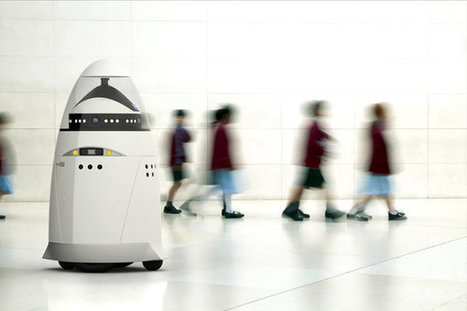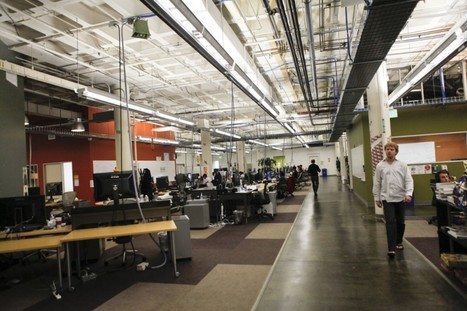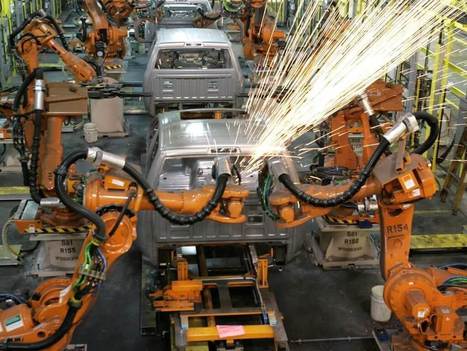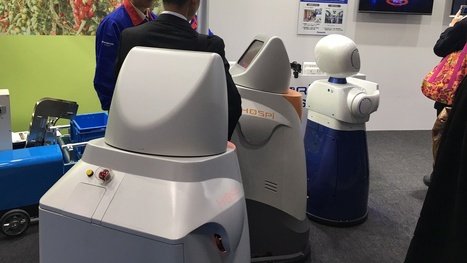 Your new post is loading...
In the last couple of years, I have spoken to many corporate Learning and Development practitioners about how they may support and enable opportunities for their workforce to learn collaboratively with each other in and during the flow of their every day work. That is, “social learning’. During these conversations, I noticed that there were some myths about social learning that I would like to dispel.
Via LGA

|
Scooped by
Edumorfosis
|
Building software for startups is a huge challenge. Not because writing the software itself is that hard, but most startups have managed to create the least optimal places to do work. In my 10+ years of experience as a software engineer at startups, I cannot trust employers to provide me with an adequate work environment, and this holds me back from doing the best possible work for them. I am an ambitious, driven individual, and I want nothing more than to provide the places I work with my best possible output. I will give whatever company I am working at 110%. Most of the places I have worked have done a great job at preventing me from doing this. That’s why from here on out, I am taking a stand and drawing a line in the sand. Henceforth I will only work in a “remote” arrangement.

|
Scooped by
Edumorfosis
|
YOUNG PEOPLE AT work are taking responsibility for their own ability, which may not be a good thing say researchers at a university in Sweden.
According to researchers at Sahlgrenska Academy at Gothenburg University, young people regard themselves as being responsible for acquiring new knowledge and motivation in the workplace.

|
Scooped by
Edumorfosis
|
The world of work is changing faster and more drastically than at perhaps any other time in recent history. According to research from the World Economic Forum, 35% of the skills necessary to thrive in a job today will be different five years from now.
How can we prepare for a workplace of the future if we’re not quite sure what it will look like? What skills or expertise should students focus on acquiring today if they want to succeed tomorrow? We spoke with five experts from the Forum’s Young Global Leaders community to get their opinion.

|
Scooped by
Edumorfosis
|
The idea of humans losing their jobs to robots/computers is currently the most virulent of all the various techno-angsts going around.
It’s a valid worry. While the exact percentage estimates vary, it’s generally understood that many of today’s jobs will soon have robots filling them instead of people. Existing robot doctors, lawyers, chefs and even journalists may not perform as well as their human counterparts yet, but they will inevitably improve—and dramatically so in many cases. Humans, not so much.

|
Scooped by
Edumorfosis
|
If you’re considering a new career, first consider whether or not the job prospect in your crosshairs will even exist in a couple decades. Indeed, a recent Oxford University study identified more than 700 jobs under threat by an increasingly automated workforce. The following are among the most at-risk.

|
Scooped by
Edumorfosis
|
Who wouldn’t want to work from home? In addition to giving you the freedom to work in your pajamas, telecommuting saves money and frustration, cutting out both the commute and dry-cleaning costs (to say nothing of the savings to your fancy coffee budget). But working from home isn’t without its pitfalls.

|
Scooped by
Edumorfosis
|
It seems that artificial intelligence (AI) and robotics are moving at lightning speed from the laboratory and are touching every single part of our lives – the way we read the news and hail a taxi has changed, and soon the way we work, and the skills needed to do our jobs will evolve. As the World Economic Forum puts it, we’re on the brink of a Fourth Industrial Revolution – and the technology that underpins it will have a huge, and some would say, unpredictable impact on business. As Andrew McAfee, explains in this Economist podcast, there is no clear distinction of the level of automation and indeed transformation of jobs. However, one thing is for sure – with digitalisation and automation such a high priority, the impact on the role of the CIO and their IT departments the world over will be profound.

|
Scooped by
Edumorfosis
|
A 2013 study found that many workers in open offices are frustrated by distractions that lead to poorer work performance. Nearly half of the surveyed workers in open offices said the lack of sound privacy was a significant problem for them and more than 30 percent complained about the lack of visual privacy. Meanwhile, “ease of interaction” with colleagues — the problem that open offices profess to fix — was cited as a problem by fewer than 10 percent of workers in any type of office setting. In fact, those with private offices were least likely to identify their ability to communicate with colleagues as an issue. In a previous study, researchers concluded that “the loss of productivity due to noise distraction … was doubled in open-plan offices compared to private offices.”

|
Scooped by
Edumorfosis
|
“Technology is not the only disrupter,” said Brett Walsh, Deloitte’s global human capital leader. “Another disrupter is the shortening in the half-life of skills.”
In conversation with Matthew Bishop, senior editor at The Economist, lifelong learning was a major talking point for the future of work.
“Lifetime learning is certainly something that we have to get used to,” said Walsh.

|
Scooped by
Edumorfosis
|
Identifying employees with the right soft skills is crucial to building a strong talent mix and setting your team up for success, and yet leaders are struggling to find and nurture these skills. In fact, LinkedIn’s 2016 Soft Skills Report found that 61 per cent of Canadian hiring managers feel that the lack of soft skills among candidates limits their company’s productivity.

|
Scooped by
Edumorfosis
|
2017 va a ser definitivamente el año de los perfiles profesionales digitales y capaces de poner la tecnología al servicio de la empresa.
Las compañías necesitan aprovechar todo el potencial que les ofrece el uso de la información y en sus plantillas carecen de la mano de obra capacitada para ello, por eso este año buscarán perfiles profesionales muy especializados y relacionados con las Tecnologías de la Información y las Telecomunicaciones, como especialistas en Big Data, vídeo engineer o ingeniero en seguridad.

|
Scooped by
Edumorfosis
|
t’s something that you try to tap into every time you design new training content. Some might say you either have it or you don’t. I would like to think that each of us can be creative if we work hard enough. If you disagree and think it’s all in the genes, I encourage you to read the research findings of Marvin Reznikoff.
Another myth about creativity has to do with a lack of resources. If you had enough money and time, you could be more creative. Unfortunately, a lack of resources is not impacting your creativity. Constraints can actually make you more creative and force you to think outside the box.
Don’t you feel much better? Genetics and a lack of resources are no longer obstacles to your creativity. Here are four things I do to boost my creativity.
|

|
Scooped by
Edumorfosis
|
Business is changing. The Towards Maturity Benchmark Report notes that 72% of CEOs believe the next three years will be more critical for their industry than the last 50. The challenge to Learning & Development teams is how they’re going to help their CEO and internal customers stay smart in uncertain times. We need to shift to a model of continuous and curated learning in the workplace. Here’s why continuous curated content matters to businesses, and how Learning Professionals can make a business case for it.

|
Scooped by
Edumorfosis
|
Telecommuting sounds like a dream. Instead of sitting in traffic, you get to spend an extra hour in bed. The coffee is better, you don't have to listen to the inane jabbering of your coworkers, and if you get through your quota of work early, you're done for the day, instead of hanging around wasting time to fill up the remaining hours. And while that may be true for some lucky folks, the reality is quite different, especially when it comes to pay and long hours.
"Rather than enhancing true flexibility in when and where employees work," write the authors of a new study, "the capacity to work from home mostly extends the workday and encroaches into what was formerly home and family time."

|
Scooped by
Edumorfosis
|
¿Quieres mejorar la manera en que tus alumnos aprenden? ¡Cambia tu forma de evaluar! En la actualidad existen infinidad de herramientas para realizar una evaluación formativa diferente al examen y que te harán la docencia mucho más práctica, rápida y fácil.

|
Scooped by
Edumorfosis
|
What’s to become of the traditional work office?
Is it possible that communications tools like Skype, Zoom.us and Google Hangouts will have the effect of making communal office spaces obsolete?
Is the day coming when organizations will redeploy workers to home offices – where they’ll have no commute, and the freedom to work all day in play clothes?
A few years ago, researchers at iconic furniture maker, Herman Miller, began a deep-dive into the future of the global workplace driven by the desire to answer questions like these. Clearly, technology already makes it possible for many people to work away from conventional offices. The question is whether that’s ultimately the best thing for workers, not to mention the companies that employ them.

|
Scooped by
Edumorfosis
|
In my previous post, I looked at how everything old is new again in regards to fears about automation taking human jobs. It’s a fear that has existed for decades at least and is now once again in high gear thanks to recent advances in robots and artificial intelligence. Robots will mostly take over the jobs humans hate doing anyway
Many robotics and AI experts aren’t too concerned with the long term, believing that machines will ultimately elevate the type of work that humans do. But there does seem to be a consensus building that societies are going to have to do something to manage the pain in the near term.
A large group of workers—mainly those whose work involves routine tasks—will indeed be displaced, so it might be wise to plan for it now.

|
Scooped by
Edumorfosis
|
Let’s start with the good news: manufacturing is returning to North America. It is called “re-shoring” and is happening for several reasons. Chief among these is that labour costs in Canada and the United States are becoming relatively more competitive as the Chinese economy soared and wages there gradually caught up to more developed economies. But there are other factors at play here, too.
In North America, corporate tax rates have become more globally competitive, as has the cost of energy. Land is also far cheaper in North America. To find 500 acres for a large manufacturing facility in Alberta, you look out a window. In Guangzhou? Even five acres could be a challenge. When you also consider the additional cost of shipping goods from Asia to North America, the case for simply making it here becomes even stronger.

|
Scooped by
Edumorfosis
|
Despite technological progress promising to solve many of Europe’s problems, people still worry about robots and automation costing jobs. But this anxiety is based on fear, not reason, warns Thilo Brodtmann.

|
Scooped by
Edumorfosis
|
Trabajar desde casa suena bastante tentador. Puedes vestirte como quieras, comer cuando te apetezca, enviar mensajes a tus amigos, hacer recados y estar en casa con tu familia. Sin embargo, esta lista de beneficios a menudo puede jugar en tu contra y hacer que no cumplas con tus tareas diarias.
Si te encuentras en esta situación y quieres marcarte un calendario que te ayude a mejorar tu productividad, ten en cuenta estos 9 consejos:

|
Scooped by
Edumorfosis
|
The Fourth Industrial Revolution will create winners and losers. Both organizations and individuals. Seismic shifts will wreak havoc in some local and national economies and may even contribute to social unrest. Tackling myriad issues involved in organizations won’t be easy. And the global economic context isn’t helping. At the very moment the global economy should have achieved a boost thanks to digital—from 2004 to 2014—labor productivity growth slowed significantly. In 30 of the 31 advanced economies it declined from a 2 percent average annual growth rate from 1994 to 2004 to a 1 percent average. Leaders need to leverage every advantage at their disposal—including one which risks being overlooked as companies focus on technology investment: ensuring people are relevant and adaptable to rise to the challenge of this new revolution. If this sounds like an HR issue—don’t be fooled. Creating the future workforce—now—is the responsibility of the very highest levels of an organization because of the complexity and the urgency of the challenge and opportunity. Navigating the path towards the workforce of the future will require leaders to ask tough questions. How do we: Attract and develop the new talent we need? Scale and accelerate the pace of change? Make sure the people with us now don’t get left behind? Secure the right amount and type of investment in our people to prepare them?

|
Scooped by
Edumorfosis
|
Old-school educators may feel intimidated by the new trends involved in the classroom, but that should only challenge them to make their classes more interesting for the students. There are various online solutions that can really promote the process of education by enabling teachers to organize the classroom activities and inspire students to get more involved. This article will list 20 new apps that promise great potential in terms of education enhancement.

|
Scooped by
Edumorfosis
|
Economist Andrew McAfee suggests that, yes, probably, droids will take our jobs — or at least the kinds of jobs we know now. In this far-seeing talk, he thinks through what future jobs might look like, and how to educate coming generations to hold them.

|
Scooped by
Edumorfosis
|
Hospi se desliza a paso lento hasta el cliente y le ofrece su surtido de bebidas. El cliente abre una pequeña nevera, donde estaría el estómago del robot si fuera una persona, y escoge una de las botellas. En su pantalla, donde estaría la cara si fuera un camarero de verdad, Hospi exhibe una sonrisa. El autómata de Panasonic demuestra sus dotes asistenciales en un hotel y en un aeropuerto de Japón.
El diseño del robot se remonta a 2004, cuando Panasonic decidió empezar a trabajar en el proyecto. Diez años más tarde salía a la luz el resultado: un robot asistencial. Las tareas que desempeña Hospi consisten en trasladar objetos y en informar a través de un altavoz.
|



 Your new post is loading...
Your new post is loading...























![[PDF] Harnessing revolution: Creating the future workforces | Edumorfosis.Work | Scoop.it](https://img.scoop.it/FRo8wlCsK8OOTGaAT19k4jl72eJkfbmt4t8yenImKBVvK0kTmF0xjctABnaLJIm9)

![[TEDxTalks] What will future jobs look like? | Edumorfosis.Work | Scoop.it](https://img.scoop.it/Y_ZP72udbkn8hYm_5vcXxDl72eJkfbmt4t8yenImKBVvK0kTmF0xjctABnaLJIm9)





